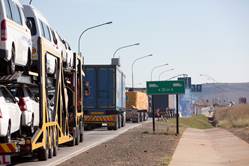Motorists think of them as places where trucks are weighed. And that is correct, but they do much more at the Traffic Control Centres (TTCs) along the national roads – ensuring the safety of road users through load control and traffic law enforcement.
Overloaded trucks cause serious damage to roads. According to Ismael Essa, SANRAL’s Northern Regional Manager, the maximum load that a truck can carry is 56 tons. If a truck is overloaded to 60 tons, for example, a single trip can do more damage to the road than 80 000 cars. “The latest research conducted by the CSIR shows that overloading causes about R5 billion damage to the national road network. This can be avoided if there is proper law enforcement and proper load controls. “Overload control helps us to achieve what we call asset preservation. If we reduce overload, we preserve the road infrastructure and prolong its lifespan. For example, a national road was designed to last for 20 years. If we allow overloading by 10%, we reduce the lifespan on the road by 8-10 years. But if we control overload properly, we can easily extend the lifespan by further 2-3 years, said Essa. The busiest TCC is at Heidelberg on the N3 which is operated by the N3TC on behalf of SANRAL. Load control oversight there is conducted by a company called Load Control Operations (LCO JV), which in turn is sub-contracted to N3TC. According to Sefora Ramothibe, Assistant Operations Manager at LCO JV, the N3 is one of the most important and busiest corridors in the country used by the freight industry. The TCC’s positive effect is very clear – overloading dropped from 25% to some 2.5%.Overloaded vehicles are detained and fined. Also, the load needs to be rectified to be within the allowable limits, before the truck can be allowed back onto the freeway.
The Heidelberg TCC handles about 92 500 trucks per month on both the northbound and southbound lanes. There is also a satellite station in the vicinity that handles about 44 500 trucks per month. It is aimed at drivers who use back routes to avoid going through the Heidelberg TCC. In total, about 10 960 trucks per month are weighed. There are also traffic officers from the Gauteng Provincial Department of Community Safety at the TCC, who deal mainly with the prosecution of drivers of overloaded trucks, as well as conducting roadworthiness tests on these vehicles. According to Joseph Mosia, the Chief Provincial Inspector, an overloaded truck means the driver is not in a good position to control the vehicle whilst in motion because the braking force cannot carry the load”. Mosia says if a vehicle is overloaded by 1-5 tons, a summon is issued – with an option to defend it before a court or pay an admission of guilt. If the vehicle is overloaded by six tons or more, the driver is arrested immediately. “Our primary objective is not to punish people – but to foster a culture of voluntary compliance amongst the road users,” he explains. According to Essa, in the Northern Region, which consists of Gauteng, North West, Limpopo and Mpumalanga, SANRAL has 15 Traffic Control Centres and 16 satellite stations on surrounding routes. TCCs are generally operated by provinces – but for reasons of funding and other challenges, SANRAL had to step in. The roads agency pays for the day-to-day running costs of the centres, while the traffic officers are provided by the provinces at their cost.






